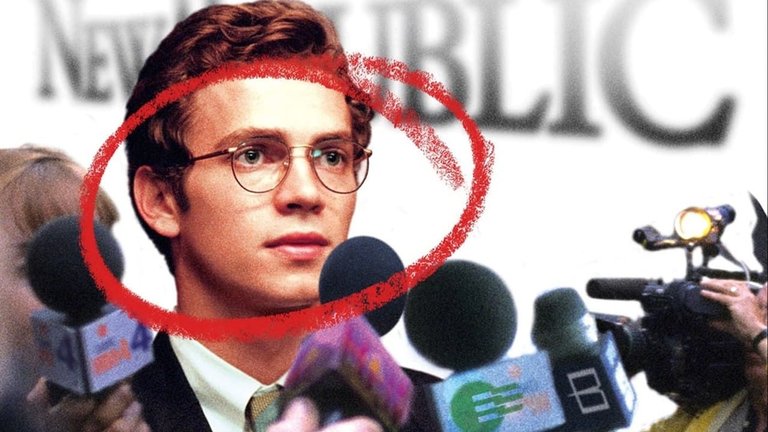Film Review: Shattered Glass (2003)

Watergate stands out as the quintessential scandal of the past half-century, which lost much, if not all, of its relevance over time. With public becoming increasingly cynical and politicians losing much of their moral authority, the myths surrounding Watergate, immortalised in Alan J. Pakula’s All the President’s Men, have already died a long time ago. One of the myths to be unraveled was the narrative of heroic journalists uncovering a dangerous conspiracy and safeguarding democracy. In today’s world, when social networks began to replace mainstream media, journalists are perceived more as part of the system, either cogs in corporate machine of psychological manipulation or, even worse, sociopaths that wield as little power and influence that they have in the most petty way possible. One of the films to deal with those issues before such trends became apparent was Shattered Glass, a 2003 drama written and directed by Billy Ray.
The film is based on 1998 Vanity Fair article by H. G. Bissinger, describing one of the major journalistic scandals in 1990s America. The plot begins in 1995 in the editorial offices of New Republic, one of America’s most respected and influential weekly magazines. Stephen Glass (played by Hayden Christensen) is a young journalist who quickly becomes one of the most popular members of staff, thanks both to his charming personality and exciting articles he writes. He quickly becomes magazine’s star reporter, while his editor Michael Kelly (played by Hank Azaria) chooses to ignore certain questionable details in one of his stories. Everything changes in 1998 following Glass’ article about teenage hacker being hired as security specialist for a software company. The article catches attention of Adam Penenberg (played by Steve Zahn), investigative journalist for Forbes Digital. After Penenberg’s attempts to find any confirmation for the claims made in the article fail, he concludes that the story is bogus and confronts New Republic with its findings. New editor of New Republic is unpopular Chuck Lane (played by Peter Saarsgard), a former colleague of Glass. At first reluctant to go against the magazine’s star and editorial staff’s darling, he starts his own investigation of Penenberg’s claims, while Glass desperately tries to prove that he didn’t make up the story.
It isn’t that surprising that Shattered Glass was made in the realm of American independent cinema. It deals with some serious issues in a very serious manner and, what it is even more important, it shatters the illusion – the very core of the business mainstream Hollywood is based on. The film’s pace is excellent, direction is solid, as well as dialogues. The only bit of criticism could be found in the framing device – fantasy scene during which Glass, as a now highly member of journalistic aristocracy, gives lecture to awestruck high school students. The scene gives too much foreshadowing and the revelations in the film have less impact because of that.
The acting is also very good. Role of Glass is so far the best in Christensen’s career – he is much more convincing in the role of real-life pathetic loser than tragic antihero of Lucas’ fictional universe. Peter Saarsgard as troubled editor is much more effective, while Zahn gives uncharacteristically subdued, yet adequate performance as Glass’ nemesis. Other actors are also fine, although their roles – like Glass’ office cheerleaders played by and Chloë Sevigny Melanie Lynskey – are there more in order to provide some big names on posters rather than serving dramatic purpose.
Although some commentators criticised Shattered Glass for its alleged lack of objectivity, based on Chuck Lane serving as film’s advisor, Billy Ray’s film can be interpreted as the criticism of the whole journalistic establishment to whom Lane belongs. The self-righteous guardians of liberal democracy and public interest allowed themselves to be duped by not particularly distinguished individual, simply in order to maintain the illusion of their professional integrity. By having few Monicagate references, creator of Shattered Glass suggests that such self-deluding mindset can flourish even in utopian times of peace and economic progress; just as Clinton allowed himself to be tarnished because of the personal arrogance, so did American media. And in a way, the affair described in the film was just one crack in the construction that would collapse on September 11th 2001 and trigger invasion of Iraq, financial crisis and many other catastrophes of 21st Century. And journalists would play major parts in those events by creating narratives as false as those of Stephen Glass, with the difference of their journalistic integrity and willingness of deception being part of institution rather than aberrant action of single individual. If Shattered Glass was intended to be seen as warning, it wasn’t heeded, at least by those that mattered.
RATING: 6/10 (++)
(Note: Original version of the review is available here.)
Blog in Croatian https://draxblog.com
Blog in English https://draxreview.wordpress.com/
InLeo blog https://inleo.io/@drax.leo
Hiveonboard: https://hiveonboard.com?ref=drax
Rising Star game: https://www.risingstargame.com?referrer=drax
1Inch: https://1inch.exchange/#/r/0x83823d8CCB74F828148258BB4457642124b1328e
BTC donations: 1EWxiMiP6iiG9rger3NuUSd6HByaxQWafG
ETH donations: 0xB305F144323b99e6f8b1d66f5D7DE78B498C32A7

Anakin Skywalker with glasses 🤣🤣